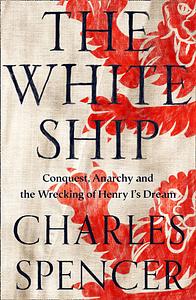Take a photo of a barcode or cover
168 reviews for:
The White Ship: Conquest, Anarchy and the Wrecking of Henry I's Dream
Charles Spencer
168 reviews for:
The White Ship: Conquest, Anarchy and the Wrecking of Henry I's Dream
Charles Spencer
informative
tense
medium-paced
informative
slow-paced
informative
medium-paced
"No ship that ever sailed brought England such Disaster" sums it up the story, which perfectly highlights the fragility or rule, and therefore life, in the Middle Ages
Charles Spencer’s The White Ship plunges readers into one of England’s greatest maritime disasters and its far-reaching consequences. The book captures the essence of a pivotal moment in medieval history with the same intensity as a contemporary thriller.
On the fateful night of November 25, 1120, the White Ship, carrying Henry I’s only legitimate heir, William Ætheling, set sail from Barfleur. Laden with the crème de la crème of Anglo-Norman society, the ship’s journey ended in tragedy when it struck rocks, leading to the death of nearly everyone on board. This catastrophe not only wiped out the future king but also set off a chain of events that plunged England into a civil war known as the Anarchy.
Spencer’s narrative is not confined to the sinking alone; he masterfully weaves the tale of the Norman dynasty from William the Conqueror to the chaotic years following the disaster. The author explores the personal histories and political machinations of the era, offering readers a vivid portrayal of a time when the quest for power was unrelenting and brutal.
One of the most striking aspects of The White Ship is how it parallels modern-day power struggles. The civil war that ensued after the shipwreck is reminiscent of a real-life Game of Thrones, where familial bonds are tested, alliances are forged and broken, and the fight for supremacy is relentless. Spencer’s portrayal of Matilda’s battle for recognition as the rightful heir highlights the gender dynamics of the time, raising questions about the evolution of female power in the centuries that followed.
Thank you to the publishers and NetGalley for the opportunity to review a temporary digital ARC in exchange for an unbiased review.
informative
tense
medium-paced
informative
medium-paced
In "The White Ship" Charles Spencer recounts the history of the Conquest and Anarchy (fictionalised in “The Pillars of the Earth” by Ken Follett), the latter being a direct result of the tragic sinking of the "White Ship" which resulted in the death of William Ætheling, Henry’s only son and heir.
Covering the period between 1066 and 1154 this book follows the family dynamics - and all the drama it involved - following the reign of William The Conqueror and the founding of a Dynasty which almost foundered following the Sinking of the “White Ship” and the dramatic Civil War that enseud.
If you’re fascinated by the real-life power struggles that shaped medieval England, The White Ship is a must-read. Spencer brings history to life with all the drama, betrayal, and high-stakes conflict that rival any work of fiction—including The Pillars of the Earth!
Covering the period between 1066 and 1154 this book follows the family dynamics - and all the drama it involved - following the reign of William The Conqueror and the founding of a Dynasty which almost foundered following the Sinking of the “White Ship” and the dramatic Civil War that enseud.
If you’re fascinated by the real-life power struggles that shaped medieval England, The White Ship is a must-read. Spencer brings history to life with all the drama, betrayal, and high-stakes conflict that rival any work of fiction—including The Pillars of the Earth!
An enjoyable read about a period of history I have found fascinating for a long time.
informative
medium-paced
adventurous
emotional
informative
sad
medium-paced
Overall this is a well put together narrative account of the disaster that fundamentally changed the course of English politics, and set up the unrest that plagued that country for decades.
At times the story wafts, and perhaps stretches too far back into history, but broad strokes are often what you get when someone who doesn't specialise in a subject tries to tackle it in a serious work. He does manage to tell the story in a compelling and emotive way. Spencer creates a heavy atmosphere in the English court as news slowly filters through that the second ship isn't coming. Many seasoned authors of fiction could take lessons from him in creating an ambience.
At times the story wafts, and perhaps stretches too far back into history, but broad strokes are often what you get when someone who doesn't specialise in a subject tries to tackle it in a serious work. He does manage to tell the story in a compelling and emotive way. Spencer creates a heavy atmosphere in the English court as news slowly filters through that the second ship isn't coming. Many seasoned authors of fiction could take lessons from him in creating an ambience.



